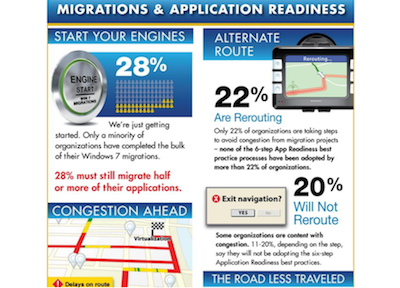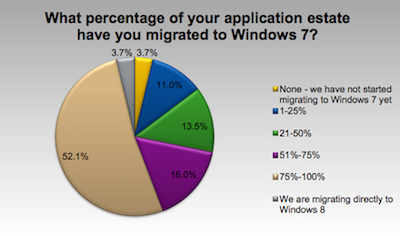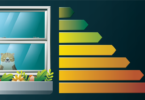aNewDomain.net — On April 8, 2014, Microsoft will pull the plug on its venerable, stable and much-beloved old operating system. The aged OS is still tremendously popular in enterprises and among home users and small businesses over the globe. Microsoft, though, is eager to get people off the platform. After months of threats, reminders and warnings, the inevitable is here. The viable life of Windows XP has come to an end. After April 8, there will be no more security updates or support.
In other words: If you choose to stick with Windows XP, you’re on your own so far as Microsoft’s concerned. Luckily, you have me to guide you through what’s next.
First, let me tell you what to expect.
The worst, security-wise.
Once Microsoft stops providing patches for Windows XP, the system will be extremely vulnerable to security risks. Hackers are already salivating at the opportunity to take over unsuspecting computers. When they find a zero-day or other flaws in the operating system, they will have access to millions of these old XP computers. Notice that I say “when” rather than “if.”
It’s only a matter of time before weaknesses will be found and exploited. Since there will be no patch from Microsoft, anyone who continues to use Windows XP after April 8, 2014 will be at the mercy of hackers and in grave risk of having his or her Windows XP computer seriously compromised. No firewall or anti-virus software will give anyone adequate protection.
Back in the day, Windows XP was the world’s most-popular operating system. Many corporations computerized their systems with Windows XP, and an enormous amount of proprietary software was developed for it. At one time Windows XP had an installed user base of more than 800 million computers. Windows XP is still running on almost 30 percent of the computers currently in use as of February 2014.
Even if the Windows XP base shrinks to 10 percent of what it once was, hackers will still have millions of computers to target. Hackers have a “the more, the merrier” mentality. They always target operating systems that have a large installed base. The flimsy security of Windows XP and the lack of official support after April will ensure that hackers will be tempted to break into these systems. Back in 2001, Windows XP security was first-rate. Now, after 12 years, it’s a bit rickety. Even though security was increased with Service Release 2, it cannot compare to the security provided by Windows 7 or Window 8.
For both individuals and organizations, there is a cost and time investment in migrating to new computers. But it must be done. The alternative of having insecure computers is not an option. Those who continue to use Windows XP after the termination date will face even-higher costs and time investments when their computer systems are compromised — and if they are connected to the Internet, they will surely be compromised after the April 8 date.
It’s not just the Windows XP operating system that’s going to be vulnerable to hackers — many, if not most, applications running on Windows XP will no longer be supported by the application vendors. It simply won’t be economically worthwhile for them to keep supporting programs written for such an outdated operating system.
Unfortunately, some companies are taking a dangerous wait-and-see attitude regarding the migration to Windows 7 or Windows 8.
A joint study of more than 750 respondents by research firm IDC and Flexera Software shows that approximately half of the respondents had completed less than 75 percent of their migration.
Even more surprisingly, a Camwood survey of 250 IT decision makers from companies of more than 2,000 seats shows that less than half of large UK organizations have started the migration away from Windows XP.
Those who are taking the “if it isn’t broken, don’t try to fix it” attitude will quickly find that after April, Windows XP will be broken and will need to be fixed. Moving to Windows 7 or 8 now is a far better economic proposition than putting off the inevitable until later in the year. In addition, these newer versions of Windows will provide better overall security as well as the ability to implement some of the latest technologies including BYOD, consumerization of IT, always-on, and easier migration to the cloud.
It’s easy to blame Microsoft for stopping Windows XP support. However, it has supported it for 12 years and that is an astonishingly-long time to commit to a software product. Microsoft actually extended its normal 10-year product lifespan by two years for this product.
If your organization hasn’t yet started or completed the migration to Windows 7 or 8, you need to stop and assess your progress or lack thereof. With the amount of proprietary software written specifically for Windows XP and the length of time that it was in use, migrating to a newer operating system will be lengthy and problematic for some organizations. Outside expertise may be needed.
Make the move now because waiting until the last minute is sure to put a bigger drain on your company’s finances and an added stress on both your IT and executive staff.
We will continue our coverage of the Windows XP deadline. Look for updates here at aNewDomain.net.
For aNewDomain.net, I’m Sandy Berger.
Based in Pinehurst, North Carolina, Sandy Berger is a veteran tech journalist and senior editor at aNewDomain.net covering tech tips and tricks, apps, gadgets, and consumer electronics. Email her at Sandy@aNewDomain.net. Follow her on Twitter @sandyberger, +SandyBerger on Google+, and on Facebook.
















Rocking piece, Sandy!
Also, what happens when patches are released for windows 7, but not for windows xp? People will know exactly what to exploit just by looking at what was patched in 7. Doesn’t bode well for all those poor connected windows xp boxes in closets all over the place. They will be prime targets.
[…] out our continuing coverage on Windows XP by Sandy Berger and Gina Smith. We will have stories on how to migrate and protect your computing in the next […]
[…] XP: “Windows XP April 8 Support Cut Off Nears: What To Do?” by Gina Smith, “Party in Hackertown: Windows XP Support Shutdown Risks Sanity“ by Sandy Berger and “Zombie Apocalypse” by Lamont Wood. We will continue to […]
[…] for our full coverage on Windows XP: Windows XP April 8 Support Cut Off Nears: What To Do?, Party in Hackertown: Windows XP Support Shutdown Risks Sanity, and […]